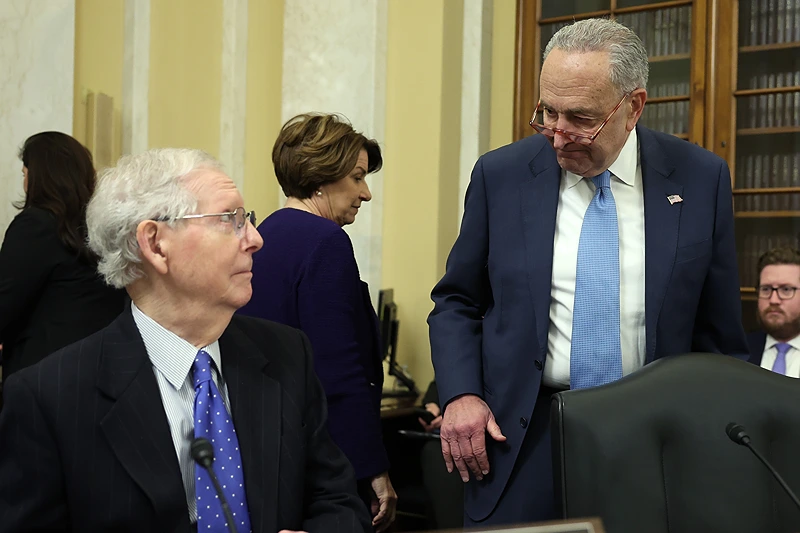
OAN’s Brooke Mallory
6:23 PM – Wednesday, February 7, 2024
A supplemental spending agreement that included funding for Taiwan, Israel, and Ukraine as well as an ambitious immigration and border security bill that faced strong resistance from Republicans in both houses was not approved by the Senate on Wednesday.
There was a 49-50 vote. For it to pass, 60 votes were required. With the exception of five Democratic no votes and four Republican yes votes, the vote generally followed party lines. As a procedural step to allow it to be revisited later, Senate Majority Leader Chuck Schumer (D-N.Y.), also voted against it, as did Senators Ed Markey (D-Mass.), Bob Menendez (D-N.J.), Alex Padilla (D-Calif.), Bernie Sanders (I-Vt.), and Elizabeth Warren (D-Ma.).
Senators Lisa Murkowski of Alaska, James Lankford of Oklahoma, Susan Collins of Maine, and Mitt Romney of Utah were the Republicans who voted in favor.
Sens. Lankford, Chris Murphy (D-Conn.), Krysten Sinema (I-Ariz.), and Biden administration representatives had been negotiating the deal for months before it was revealed on Sunday night.
The $118 billion package includes $20 billion in efforts to address the historically dire situation at the southern border, $60 billion for Ukraine, $14 billion for Israel, help to Taiwan, and humanitarian relief to Gaza. It was a reaction to a late-year request for additional cash from the White House to Congress.
The “emergency border authority” that was the centerpiece of the border package required the expulsion of illegal migrants in the manner of Title 42 when the number of migrants exceeded 5,000 per day over a rolling seven-day average.
Along with cutting the length of time it takes to obtain asylum from years to months, it would also provide asylum applicants with instant work permits and finance a significant increase in border staffing and immigration judges. Along with more green cards, $650 million for the border wall, more funds for NGOs and migrant-receiving communities, and $450 million for nations to repatriate and resettle illegal immigrants are also included.
The package was portrayed by the administration and negotiators as a harsh yet equitable solution to the border issue, but as soon as Republicans in the House deemed it unworkable, conservative resistance in the Senate mounted.
This week, over 20 Republican members of the upper house argued and cautioned that the measures would not curtail the historically high number of illegal migrant crossings to the point where they would return to record-high levels of immigration.
“We supported a negotiation to bring commonsense border security to this country,” Sen. JD Vance (R-Ohio.), said Tuesday. “We did not agree to a border fig leaf to send another $61 billion to Ukraine.”
“But the fact of the matter is the package includes catch and release still providing additional continuing incentives for people to come to the country illegally knowing they’ll be released into the interior and it does nothing to stop the Biden administration from abusing something called parole,” said Sen. John Cornyn (R-Texas.)
Left-leaning immigration organizations and a few liberal Democrat senators opposed it as well, arguing that it would “hurt asylum-seekers.”
The measure was referred to by Menendez as “an outright betrayal to the communities we have sworn an oath to protect and represent.” After the text was made public on Sunday night, Republican Leader Mitch McConnell of Kentucky stated on Tuesday morning that it had little chance of passing.
“I think, in the end, even though the product is approved by the [National Border Patrol Council] that adores President Trump, most of our members feel that we’re not going to be able to make a law here,” said McConnell, who strongly supports Ukraine aid.
Schumer will now set up a vote on the supplemental package without the border security element, but it is unclear when that will happen. The border and foreign aid package has now been killed. Majority of Republicans have maintained that they will only support further funds for Ukraine when the southern border is secured.
Had the measure made it through the Senate, it was also very likely going to be defeated in the GOP-controlled House, where more Democrats opposed it because of concerns over the border security elements, in addition to the leadership’s clear opposition to the package.
Stay informed! Receive breaking news blasts directly to your inbox for free. Subscribe here. https://www.oann.com/alerts

